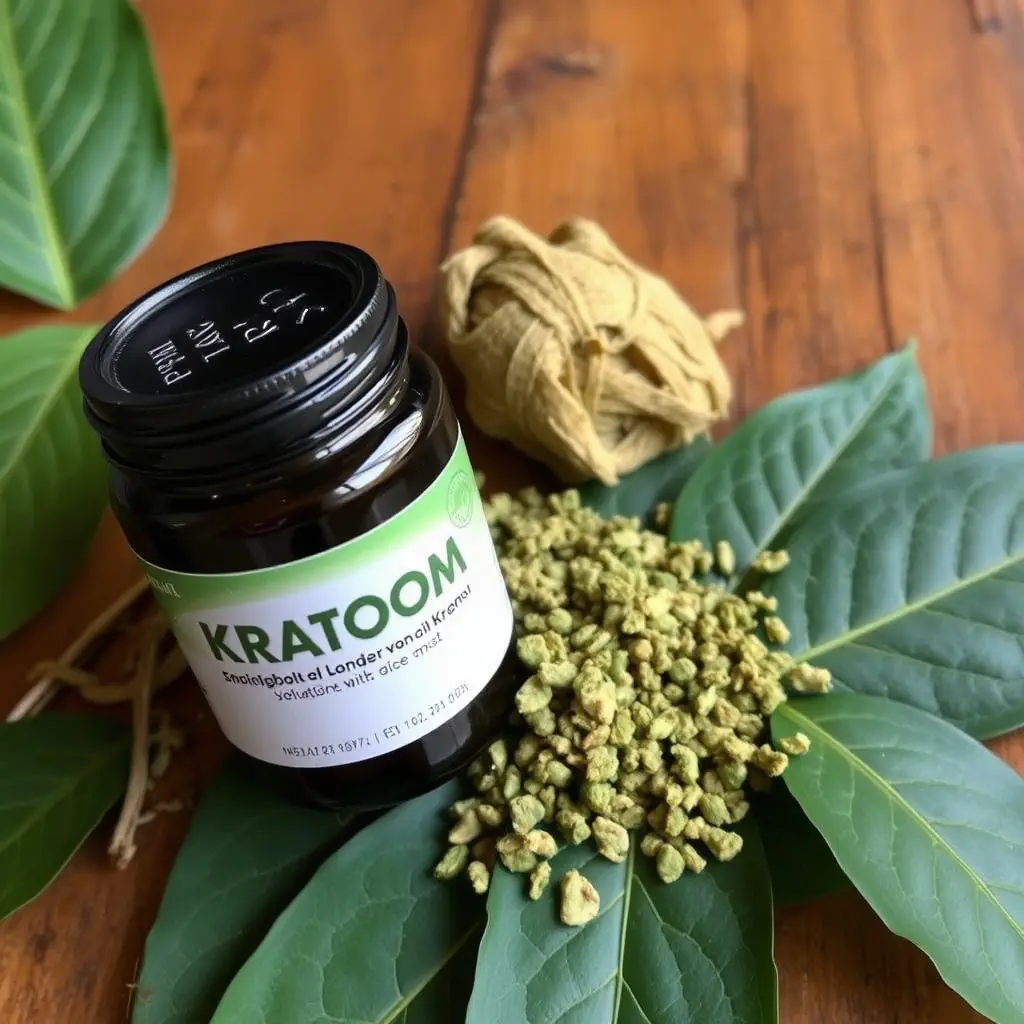Chronic Fatigue Syndrome (CFS) involves severe fatigue that doesn't improve with rest and is worsened by physical activity, accompanied by sleep disturbances, cognitive problems, muscle pain, and flu-like symptoms. Due to its complex nature, diagnosing and treating CFS can be challenging. Kratom, from the Mitragyna speciosa plant, has been explored as a natural intervention for managing CFS symptoms due to its active compounds, mitragynine and 7-hydroxymitragynine, which may alleviate pain and improve mood by interacting with opioid receptors in the brain. However, the optimal kratom dosage varies greatly among individuals, necessitating a tailored approach under medical supervision to determine how many kratom capsules to take for safe and effective relief. It's essential for patients to consider the legal status and purity of kratom products, ensuring they obtain them from trustworthy sources. As research continues, we may gain clearer insights into kratom's role in CFS management, potentially offering a significant treatment alternative. For those interested in using kratom as part of their CFS management strategy, it's crucial to work closely with healthcare providers to monitor efficacy and side effects, and to combine this approach with other therapeutic methods for comprehensive symptom relief.
Chronic fatigue syndrome (CFS) presents a complex challenge, often leaving individuals in a state of persistent, unexplained fatigue that defies traditional medical interventions. Kratom, a botanical substance with a rich history in traditional medicine, has emerged as a potential ally in the management of CFS symptoms. This article delves into the therapeutic potential of kratom for those suffering from CFS, offering guidance on optimal dosage and integrating it within a comprehensive management strategy. Understanding the right amount of kratom capsules to take is crucial for safe and effective symptom relief. Join us as we explore the intersection of herbal medicine and chronic illness, and how kratom may offer hope to those navigating the debilitating effects of CFS.
- Understanding Chronic Fatigue Syndrome (CFS) and Kratom's Role in Management
- Navigating Kratom Dosage for CFS: How Many Kratom Capsules to Take
- Integrating Kratom into a Holistic Approach for Managing Chronic Fatigue Syndrome
Understanding Chronic Fatigue Syndrome (CFS) and Kratom's Role in Management

Chronic Fatigue Syndrome (CFS) is a complex and often debilitating condition characterized by profound fatigue that is not relieved by rest and is worsened by physical activity. The pathophysiology of CFS is not entirely understood, and it presents a significant challenge in terms of diagnosis and treatment. Patients with CFS typically experience a constellation of symptoms including sleep disturbances, cognitive impairment, muscle pain, and a host of other flu-like symptoms that can significantly impact daily functioning.
In the context of managing CFS, natural interventions are often explored to complement conventional treatments. Kratom, a plant-based supplement derived from the leaves of Mitragyna speciosa, has gained attention for its potential therapeutic properties. While kratom is traditionally used in certain cultures for its stimulant and sedative effects, recent anecdotal evidence and preliminary studies suggest it may offer relief for individuals with CFS. The active compounds found in kratom, mitragynine and 7-hydroxymitragynine, are believed to influence the brain’s opioid receptors, leading to pain relief and improved mood. However, it is crucial for those considering kratom as a management strategy for CFS to approach its use with caution and under medical supervision. The appropriate dosage of kratom, typically administered in capsule form, can vary widely among individuals due to differences in metabolism, tolerance, and sensitivity. It is important for patients to consult with healthcare professionals to determine how many kratom capsules to take, as dosing must be individualized to avoid adverse effects or the development of dependency. Additionally, the legality and purity of kratom products can vary, making it essential to obtain kratom from reputable sources. As research continues to evolve, the role of kratom in CFS management may become clearer, offering hope for those seeking alternative methods to alleviate their symptoms and improve their quality of life.
Navigating Kratom Dosage for CFS: How Many Kratom Capsules to Take

When managing Chronic Fatigue Syndrome (CFS) with kratom, determining the appropriate dosage is crucial for both safety and efficacy. Kratom capsules contain mitragynine and 7-hydroxymitragynine, alkaloids that are believed to interact with opioid receptors in the brain, potentially offering relief from the debilitating fatigue associated with CFS. However, the optimal dosage can vary significantly among individuals due to factors such as body weight, tolerance, and specific strain potency.
It is generally recommended to start with a low dose of kratom capsules to assess individual sensitivity and effects. A typical initial dose might range from 1 to 3 grams of powdered kratom, which translates to approximately 2 to 4 capsules, depending on the milligram content of each capsule. This starting point allows for a careful introduction to the effects of kratom while minimizing potential side effects. Patients should monitor their response and adjust their intake as needed, keeping in mind that the effects can last several hours. It is also important to consider that some individuals may require higher doses, potentially up to 5 to 9 grams, split across two or three doses throughout the day to manage CFS symptoms effectively. However, it is imperative to approach any increase in dosage with caution and ideally under the guidance of a healthcare provider, as kratom can interact with other medications and may have adverse effects at high dosages. Regular monitoring of both effectiveness and side effects is essential when incorporating kratom into a CFS management plan.
Integrating Kratom into a Holistic Approach for Managing Chronic Fatigue Syndrome

Chronic fatigue syndrome (CFS) is a complex condition characterized by severe, persistent fatigue that is not relieved by rest and affects one’s ability to lead a normal life. Integrating kratom into a holistic approach for managing CFS involves careful consideration of the appropriate dosage and strain selection to mitigate symptoms effectively. Kratom, a plant from Southeast Asia, contains alkaloids that interact with the body’s opioid receptors, potentially offering pain relief and mood enhancement. When incorporating kratom capsules into CFS management, it is crucial to adhere to guidance on how many kratom capsules to take, as the ideal dosage can vary based on individual tolerance, metabolism, and the specific strain’s potency.
In a holistic strategy, kratom serves as a complementary measure alongside other therapies like cognitive-behavioral therapy (CBT), graded exercise therapy (GET), and adequate sleep hygiene. The key to successful kratom use lies in its ability to manage pain and improve mood, which are often debilitating aspects of CFS. Patients should consult healthcare providers for personalized advice on how many kratom capsules to take, as the dosing can significantly impact one’s well-being and symptom relief. Regular monitoring is essential to ensure that kratom is safely integrated into the overall treatment plan and to make adjustments as needed based on the individual’s response to the therapy. This holistic approach aims to improve the quality of life for those with CFS by addressing both the physical and psychological components of the condition.
Managing chronic fatigue syndrome through a holistic approach can be complex, yet incorporating kratom into this regimen may offer significant relief for those affected. This article has elucidated the nature of CFS and the potential role of kratom in its management. A key takeaway is determining the appropriate kratom dosage for CFS, a critical factor for safe and effective use as outlined in the ‘Navigating Kratom Dosage for CFS’ section. By integrating kratom thoughtfully within a comprehensive treatment plan, individuals may find improved symptom management. It is imperative for those considering this approach to consult healthcare professionals to ensure proper dosing and safety. With careful consideration and professional guidance, kratom may serve as a valuable component in the multifaceted strategy to cope with CFS.






